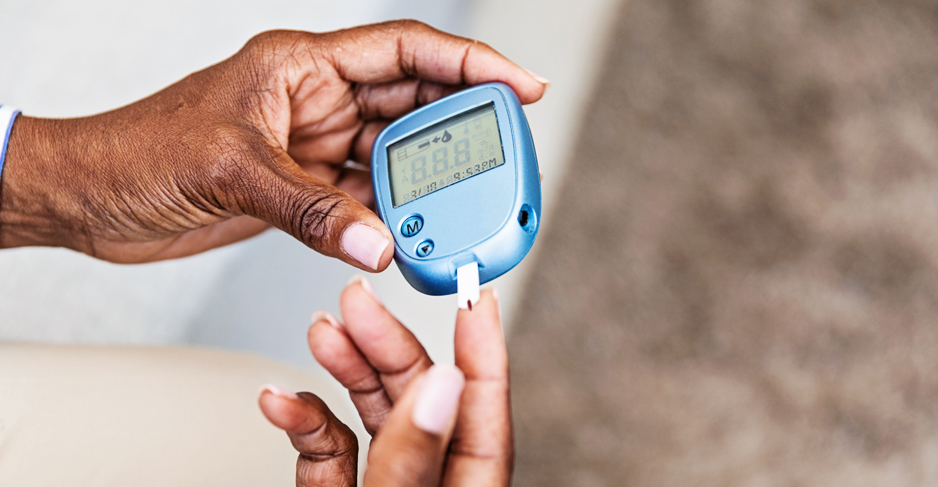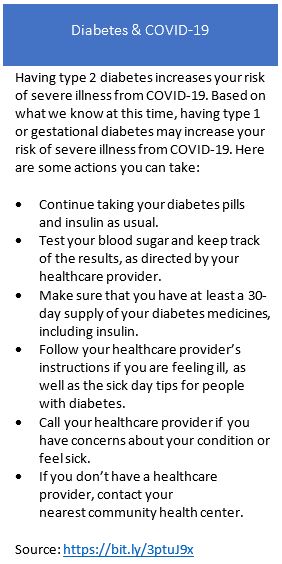Prep Your Health: How to Manage Diabetes in an Emergency
Posted on by
November is National Diabetes Month
About 34.2 million Americans live with diabetes, meaning their bodies don’t make enough insulin or can’t use the insulin they make to turn food into energy. In either case, the result is too much sugar in the bloodstream. Over time, this can cause serious health problems such as heart disease, vision loss, and kidney disease.(1)
There are three main types of diabetes: type 1, type 2, and gestational diabetes (diabetes while pregnant).(1)
There isn’t a cure yet for diabetes, but losing weight, eating healthy food, and being active can help. Taking medicine as needed, getting diabetes self-management education and support, and keeping healthcare appointments can also reduce the impact of diabetes on your life.(1)
Emergency Preparedness
The everyday self-management of diabetes can be challenging, but it is doable with support from your healthcare team, family, teachers, and others, along with education, self-care, and personal preparedness. Self-managing diabetes during a disaster or emergency is more difficult but not impossible if you are prepared.
Emergencies and disasters can have widespread and long-lasting impacts on the availability of medical supplies, medications, and services. For all these reasons, it is important that you prepare your health by having an emergency supplies kit.
Gather Your Personal Needs
Personal needs are items that you cannot do without in an emergency, starting with the basics of food and water.
Because hypoglycemia (low blood sugar) can happen quickly and must be treated immediately, people with type 1 diabetes are encouraged to keep items that contain sugar (e.g., glucose tablets, juice boxes, honey, hard candy) with them at all times, including during an emergency.
Hypoglycemia is most often caused by too much insulin, waiting too long for a meal or snack, not eating enough, or getting extra physical activity. Hypoglycemia symptoms are different from person to person but can include shakiness, dizziness, difficulty concentrating, blurred vision, sweating, and weakness or fatigue.(2)
Prepare Your Prescriptions
Managing blood sugar levels and making sure your body gets enough energy can be tough during an emergency. Be prepared in case supplies and medicines are hard to get and to store.
- Contact your doctor or pharmacist to talk about creating an emergency supply of prescription medications. Some states have emergency prescription laws that may allow pharmacists to dispense insulin in emergency situations.
- During an emergency, you may need to use a different insulin brand or type instead of your regular insulin. You should work with your doctor if you need to switch insulin brands or types, but that might not be possible in crisis conditions. In that case, follow this emergency guidance from the Food and Drug Administration (FDA), monitor your blood sugar closely, and contact your doctor as soon as possible.(3)
- Invest in a cooler and reusable cold packs to help keep medicines cold. Try to keep your insulin as cool as possible, but make sure not to freeze it. Insulin that has been frozen can break down and will be less effective.(3)
- If you use an insulin pump, you may be able to substitute another short-acting insulin for your usual insulin (see FDA’s emergency guidance). Check the instructions for your pump to see which insulin types will work. The FDA guidance also explains which insulin types you can use instead of your usual insulin if you need to switch from using your pump to using injectable insulin (taken with a needle).(3)
Store Medical & First Aid Supplies
Having an emergency supplies kit with medical and first aid supplies can be vital during an emergency when you might not be able to go out and buy more.
- Call a diabetes educator to get support and guidance on how to buy diabetes supplies, including single-patient-use insulin pens and syringes, and store them properly.
- People with diabetes are more vulnerable to infections. Pay careful attention to the health of your feet and keep a fully stocked first aid kit ready to treat any wounds.
- Have extra supplies for your insulin pump or continuous glucose monitor, supplies to check your blood sugar (i.e., testing strips, lancets), and extra batteries for your devices.
Making sure you have an emergency supplies kit ready with supplies can seem daunting, but a little prep can help lessen the stress during an emergency.
Resources
- CDC Infographic
- CDC Diabetes
- Diabetes Emergency Preparedness
- Diabetes Disaster Preparedness Plan
- FDA Emergency Preparedness
- Diabetes Disaster Response Coalition Checklist
- American Diabetes Association
References
- https://www.cdc.gov/diabetes/basics/diabetes.html
- https://www.cdc.gov/diabetes/basics/type1.html
- https://www.cdc.gov/diabetes/library/spotlights/managing-insulin-emergency.html
Thanks in advance for your questions and comments on this Public Health Matters post. Please note that the CDC does not give personal medical advice. If you are concerned you have a disease or condition, talk to your doctor.
Have a question for CDC? CDC-INFO (http://www.cdc.gov/cdc-info/index.html) offers live agents by phone and email to help you find the latest, reliable, and science-based health information on more than 750 health topics.
Posted on by

